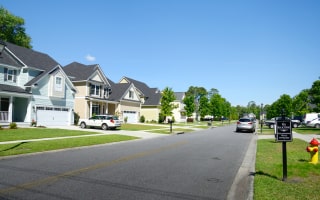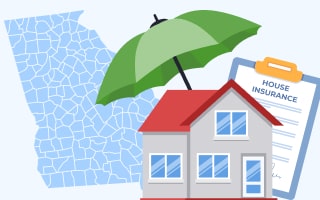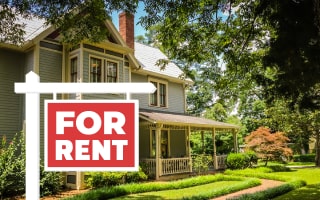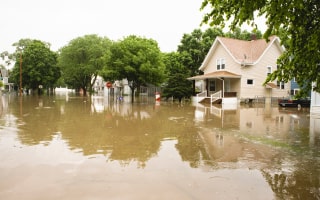Homeowners Insurance in Georgia

Georgia, the state with many songs named after it, is located in the Southeastern part of the U.S., just above Florida. The Southeast is prone to many types of wild weather, including tornadoes, landslides, earthquakes, and hurricanes. Georgia is most often tormented by tornadoes and hurricanes with severe wind and hail damage. Georgia also has some coastline, which could cause potential flooding. Since 1953, Georgia has had 65 federally declared natural disasters, and its rate of disasters per 1 million people is 5.83.
No states require homeowners insurance, but it's strongly recommended that all homeowners obtain some to protect their homes in the event of a disaster. If you take out a mortgage to buy your property in Georgia state, your lender will demand that you purchase homeowners insurance and keep it active for the life of the loan. The bank will require specific coverage levels, which you will need to know before buying a policy.
The average rate of homeowners insurance in Georgia is $2,184/year. In the U.S., the average rate for $300,000 of homeowners coverage is $2,601/year with a $1,000 deductible. Georgia is slightly below the national average. Rates vary by the age, value, and condition of your home and by carrier.
Types of Homeowner Insurance Coverage Available in Georgia
Depending on where you live, you may be eligible for different types of coverage. Different providers offer specific types. In Georgia, you can purchase the following types of homeowners insurance:
-
Dwelling Coverage: Dwelling coverage pays to repair or replace your house should it be damaged or destroyed in a covered event. This coverage is based on the value of your home and how much it will cost to replace it.
-
Liability Coverage: If someone gets hurt on your property and they sue you, this coverage will pay for your legal bills up to a specific limit.
-
Personal Property: This coverage pays to replace your belongings if they are destroyed in a disaster, vandalized, or stolen.
-
Other Structures: Other structures coverage refers to detached items like pools, hot tubs, fences, sheds, and garages. It pays to replace them after a disaster.
-
Guest Medical: If someone is injured on your property, this pays their medical bills.
-
Additional Living Expenses (ALE): If your house is destroyed and you must leave while it is rebuilt, this coverage will pay your living expenses, such as food, lodging, pet boarding, furniture rental, etc.
Some lenders may also require you to purchase an umbrella policy that covers anything the other coverages do not. This policy provides a safety net to ensure you can restore your Georgia property to its original state.
Some of Georgia is coastline, meaning potential floods. Flood insurance is extra but recommended for anyone living in flood zones.
FEMA (Federal Emergency Management Agency) manages the National Flood Insurance Program (NFIP) through a network of 50 providers across the U.S.
Since most homeowners insurance does not cover floods, this supplemental coverage can repair damage and replace items after a flood. Depending on the options you choose, it can cover the building and/or your personal belongings. This program is available to homeowners, renters, and businesses. Learn more about the program on FEMA's website.
Home Insurance and Natural Disasters
Severe weather is increasing year over year in the U.S., causing more claims and enormous losses for insurance providers. Climate change, more than anything else, is impacting the insurance market in a big way. Over the past five years, home insurance rates have spiked by 34%, and even more in some places. Georgia saw an increase of 27.0% from 2018 to 2023.
According to Realtor.com, 44.8% of U.S. homes experience damage from at least one extreme climate event, and many of them are underinsured.
Georgia experiences hailstorms, windstorms, tornadoes, and hurricanes. From 1980 to 2024, Georgia has had 129 billion-dollar disasters. In 2023, Georgia had 58 tornadoes with widespread damage and one fatality. Additionally, the state had 3,621 wildfires, destroying 25,017 acres of land.
The average cost of a wildfire is $3.3 billion. Hurricanes cause $32.1 billion of damage, severe storms cause $10.5 billion of damage, and floods cause $4.6 billion.
How Can I Save on Homeowner Insurance Premiums in Georgia?
Homeowners premiums vary in price due to many factors. Some of the most common things that affect your home insurance rate are:
-
Location: Where you live matters. Your premiums will be higher if you live in an area prone to nasty weather or high crime.
-
Size & Condition: The size and condition of your home will also be a factor. The more expensive it is to rebuild your home, the higher your rates will be.
-
Deductible: You choose your deductible amount. The higher the deductible, the lower your rates. Balance how much you can afford with the right coverage.
-
Credit Score: People with good credit pay lower rates than those with credit problems.
-
Additional Risks: If you have risks like certain breeds of dogs, a pool, or a trampoline, you will pay higher rates than those without these risks.
-
Level of Coverage: The amount of coverage you need will impact your rates. The more coverage, the higher the cost.
-
Claims History: Keep a clean claims history for lower rates. The more claims you have, the more your insurance will increase.
Shop around when buying home insurance to find the best rates and discounts. Some ways to save include:
- Storm Shutters: Add storm shutters to help keep your windows safe from hurricanes, tornadoes, hailstorms, and other windstorms.
- Raise Your Deductible: Increase your deductible as much as possible for lower rates.
- Bundle Policies: Bundle your home and auto insurance to save money.
- Install Security: Install safety or security devices to save more money.
- Ask for Discounts: Ask your provider for other discounts.
Home Insurance Discounts in Georgia
Home insurance covers repairing or rebuilding your house after a disaster like a fire, tornado, or flood. It also covers things like a tree falling on the house, theft, vandalism, and hail damage. You can purchase liability insurance, which pays for lawsuits if someone gets hurt while on your property and pays their medical bills. Most home insurance policies also include loss of use and detached structures.
You can buy a policy through online websites, by phone, or by finding a local agent. Regardless of what carrier you use, you must pay the first year in advance. After that, you can pay monthly through your escrow or an annual fee.
Home insurance prices are going up all the time, making it essential to look for discounts and ways to save. Some common discounts offered by providers are:
- Senior Discounts: Many carriers offer discounts for senior citizens.
- Vet & Military: Some providers will take money off for enlisted people and vets.
- Loyalty Discounts: If you remain a customer for years, your rates may go down.
- Multi-policy Discounts: Bundle your policies for discounts.
- Paperless Discounts: Go paperless and help the environment, plus get cheaper rates.
Common Rates Offer by Homeowners Insurance Firms
New construction homes cost much less to ensure, sometimes as much as 40% less. On average, you will pay about $80/month for new home insurance. However, things like your credit score, claims history, and other factors will affect your rates regardless of the age of the home.
Top 10 Insurance Firms in Georgia and Average New Home Savings
| Company | % savings |
|---|---|
| Nationwide | 76% |
| State Farm | 51% |
| Amica | N/A |
| Travelers | 63% |
| Allstate | 47% |
| USAA | 54% |
| Lemonade | N/A |
| Chubb | N/A |
| Liberty Mutual | N/A |
| Auto-Owners Insurance | N/A |
Home Insurance and Renovations in Georgia

Home renovations can drastically upgrade your house and make it even more of a home. Upgrades and renovations can also impact your home insurance. Some may increase the value of your home but raise your rates. Other things will make your home safer, with less risk, and lower your rates. Others may not affect your premiums at all.
![]() Home Renovations that Increase Your Rates
Home Renovations that Increase Your Rates
Some home renovations that increase your rates include:
- High-End Upgrades: If you re-do your kitchen with expensive fixtures, countertops, cabinets, and appliances, it will cost more to replace them, and your insurance rates will increase.
- Swimming Pool & Hot Tub: Adding "attractive nuisances" like pools and hot tubs increases the fun but also your insurance rates.
- Adding Square Footage: If you enlarge the footprint of your home and add more space, it will cost more to replace, and therefore, your rates will go up.
![]() Home Renovations that Decrease Your Rates
Home Renovations that Decrease Your Rates
Some home renovations that decrease your rates include:
- Replace Wiring and Plumbing: Replacing your wiring can drastically reduce your risk of fire, and replacing plumbing could avoid costly water damage. Let your insurer know, and they should lower your rates.
- Replace Your Roof: Replacing your roof with stronger, more wind-resistant materials could save you from making claims and save on your insurance rates.
- Home Security System: Adding a home security system, including monitoring cameras, could earn you a significant discount on your insurance, especially if you live in a crime-prone region.
Replacing your roof with high-end materials may also increase your rates or cancel out the discount. Some upgrades add and subtract from your premiums.
Homeowners insurance covers damage caused by a qualifying event. If you decide to upgrade your wiring, plumbing, kitchens, and baths on your own, your insurance will not pay for those things, only things damaged by a covered peril.
It's a good idea to discuss any renovations with your insurance agent before beginning work. Find out how they will impact your insurance coverage and rates.
Georgia Renters' Insurance

Renters insurance is like homeowners insurance for people who rent apartments, condos, and houses. Its primary purpose is to protect personal belongings, but it can also provide liability protection, medical payments, and loss of use. Renters insurance does not provide dwelling coverage; that must be handled by the owner.
Renters insurance kicks in when your belongings are destroyed or damaged by:
-
Fire & Smoke
-
Vandalism
-
Theft
-
Lightning
-
Windstorms
-
Explosions
-
Break-ins
-
Water Damage (broken pipes, etc.)
Renters insurance is priced based on location (urban crime-heavy areas are more expensive), coverage (the more coverage, the higher the rate), and number of units (the more units, the lower the cost).
Georgia's typical renters insurance rate is $35/month, which is more than the national average of $148/year. This is due to the high crime rates in many areas of Georgia. Urban areas are much more expensive than safer suburban regions.
Condo Insurance in Georgia

Condo insurance is specifically for condo owners. It's also known as HO-6 insurance and picks up where the condo association's master policy leaves off. Each condo development has its own "master policy", which covers replacing the dwellings and restoring them back to their original condition. Condo owners need HO-6 insurance to cover any upgraded materials and renovations made since they were built. Between the two policies, the condo should be restored back to its latest condition.
Unlike renters insurance, condo insurance does cover the dwelling (inside only). The liability portion covers only accidents that happen within the condo, not outside or on common property.
Condo insurance covers personal property, personal liability, personal injury, loss of use, and loss assessment. If your condo is destroyed by a fire, storm, or other peril, your insurance will replace the following:
- Furniture
- Fixtures
- Interior Walls
- Appliances
- Flooring
- Wiring and Plumbing
- Countertops
- Cabinets
- Personal Belongings
The average cost of condo insurance in Georgia is $798/year, or $67/month, with a $1,000 deductible, $60,000 of personal belonging coverage, and $300,000 of liability coverage.
As with other types of homeowners insurance, you can save by:
- Increasing Your Deductible
- Bundling Your Insurances
- Install Security of Safety Features
- Lowering Your Risk
- Signing Up for Auto Payments or Paperless Billing
- Don't File Small Claims, Wait for Big Ones
- Ask About Discounts
Georgia Home Insurance Market
Insurance providers lost big in Georgia five out of the last seven years. It's the worst record of any state because Georgia had 14 billion-dollar disasters last year alone, more than any other state except for Texas. The reasons for the pitiful state of homeowners insurance in Georgia are the frequent tornadoes, wildfires, and hurricanes. Many insurers are pulling out of states like Georgia, where the risk and losses are too high.
No federal agency regulates homeowners insurance. Instead, state agencies ensure that each provider acts professionally and treats customers fairly. In Georgia, that agency is Insurance and Fire Safety, located at Two Martin Luther King, Jr. Drive, Atlanta, GA 30334.
Homeowners Insurance Guide
- Homeowners Insurance in Georgia
- Types of Homeowner Insurance Coverage Available in Georgia
- Home Insurance and Natural Disasters
- How Can I Save on Homeowner Insurance Premiums in Georgia?
- Home Insurance Discounts in Georgia
- Home Insurance and Renovations in Georgia
- Georgia Renters' Insurance
- Condo Insurance in Georgia
- Georgia Home Insurance Market
Instant Access to Georgia Property Records
- Owner(s)
- Deed Records
- Loans & Liens
- Values
- Taxes
- Building Permits
- Purchase History
- Property Details
- And More!
Homeowners Insurance Guide
- Homeowners Insurance in Georgia
- Types of Homeowner Insurance Coverage Available in Georgia
- Home Insurance and Natural Disasters
- How Can I Save on Homeowner Insurance Premiums in Georgia?
- Home Insurance Discounts in Georgia
- Home Insurance and Renovations in Georgia
- Georgia Renters' Insurance
- Condo Insurance in Georgia
- Georgia Home Insurance Market